2023-2024学年英语鲁教版(五四学制)六年级下册Unit 6 Don’t eat in class. 单元习题课件(共25张PPT)
文档属性
| 名称 | 2023-2024学年英语鲁教版(五四学制)六年级下册Unit 6 Don’t eat in class. 单元习题课件(共25张PPT) |

|
|
| 格式 | pptx | ||
| 文件大小 | 176.8KB | ||
| 资源类型 | 教案 | ||
| 版本资源 | 鲁教版 | ||
| 科目 | 英语 | ||
| 更新时间 | 2024-07-05 00:00:00 | ||
图片预览

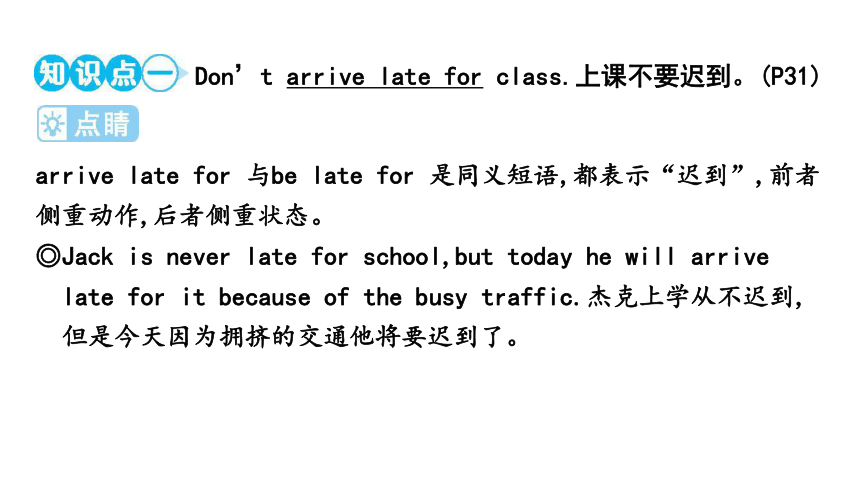
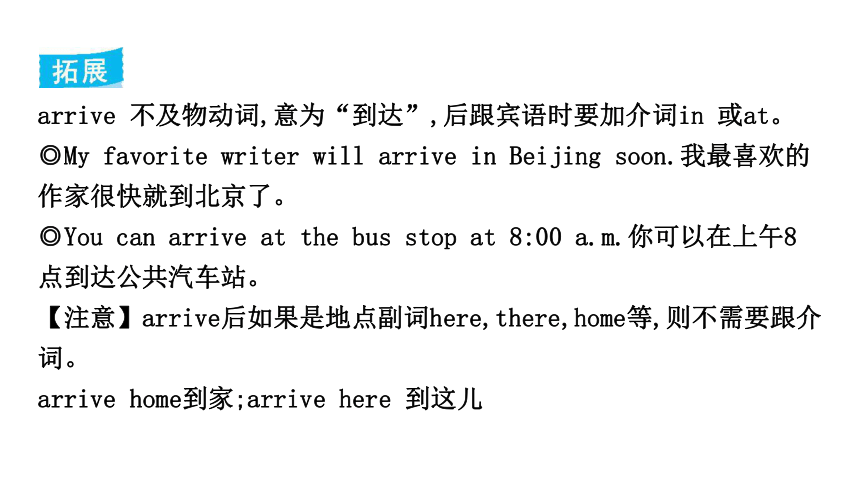
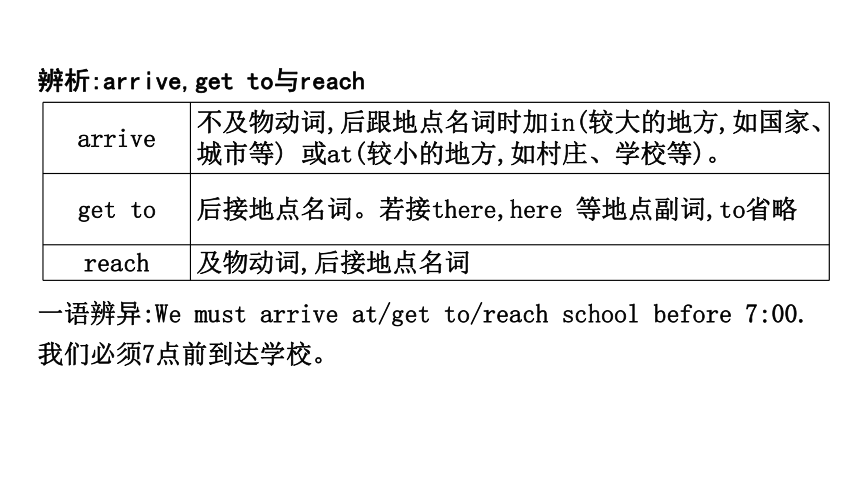
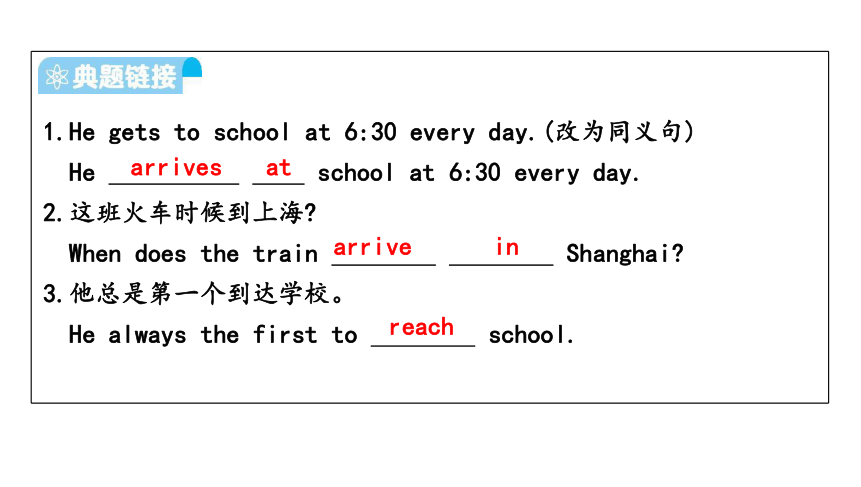
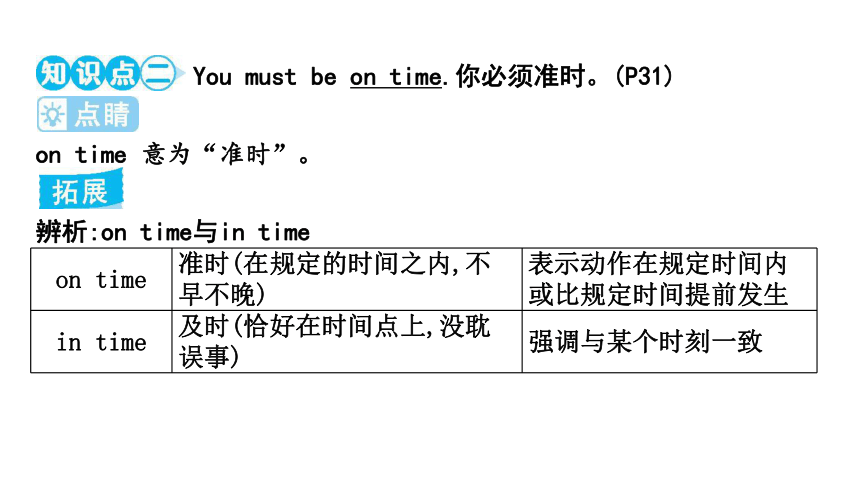
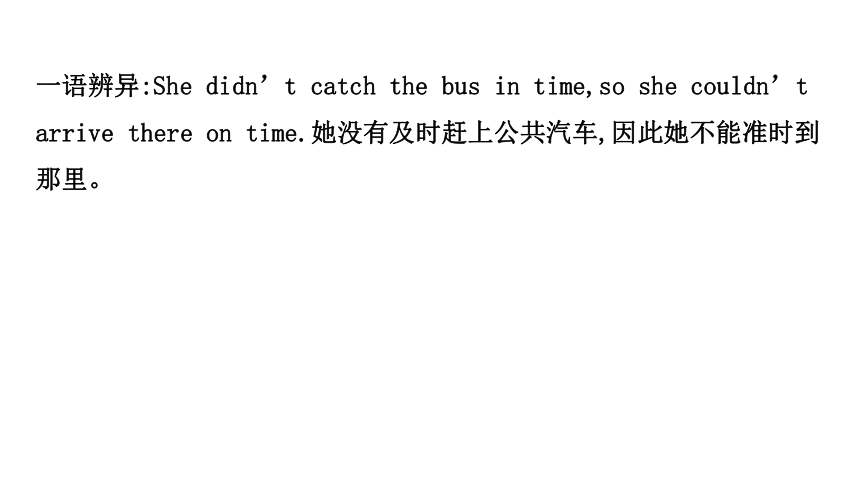
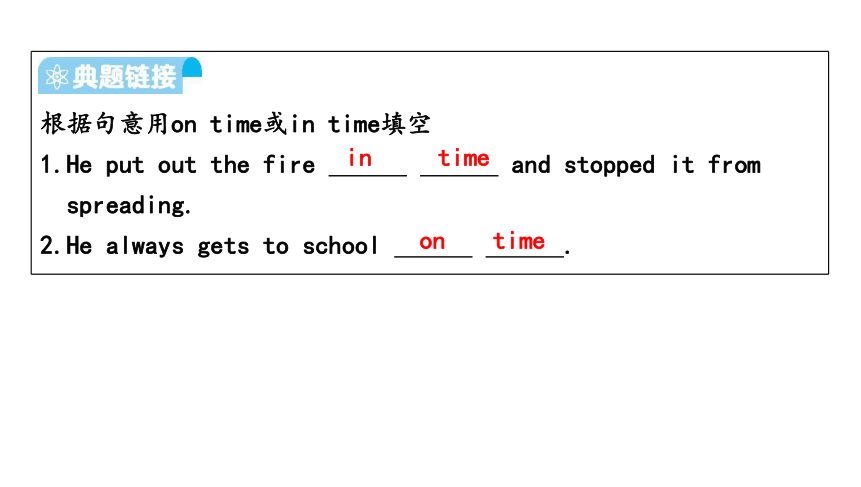
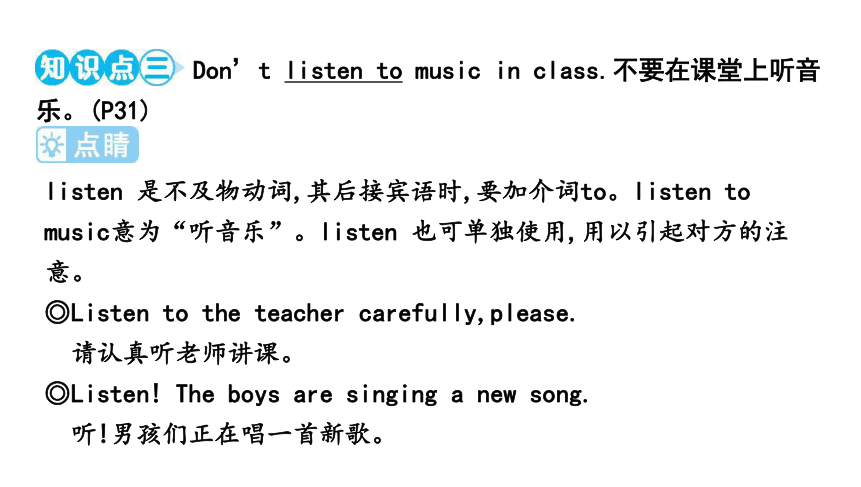
文档简介
(共25张PPT)
Section A
Don’t arrive late for class.上课不要迟到。(P31)
arrive late for 与be late for 是同义短语,都表示“迟到”,前者侧重动作,后者侧重状态。
◎Jack is never late for school,but today he will arrive
late for it because of the busy traffic.杰克上学从不迟到,
但是今天因为拥挤的交通他将要迟到了。
arrive 不及物动词,意为“到达”,后跟宾语时要加介词in 或at。
◎My favorite writer will arrive in Beijing soon.我最喜欢的作家很快就到北京了。
◎You can arrive at the bus stop at 8:00 a.m.你可以在上午8 点到达公共汽车站。
【注意】arrive后如果是地点副词here,there,home等,则不需要跟介词。
arrive home到家;arrive here 到这儿
辨析:arrive,get to与reach
arrive 不及物动词,后跟地点名词时加in(较大的地方,如国家、城市等) 或at(较小的地方,如村庄、学校等)。
get to 后接地点名词。若接there,here 等地点副词,to省略
reach 及物动词,后接地点名词
一语辨异:We must arrive at/get to/reach school before 7:00.我们必须7点前到达学校。
1.He gets to school at 6:30 every day.(改为同义句)
He school at 6:30 every day.
2.这班火车时候到上海
When does the train Shanghai
3.他总是第一个到达学校。
He always the first to school.
arrives
at
arrive
in
reach
You must be on time.你必须准时。(P31)
on time 意为“准时”。
辨析:on time与in time
on time 准时(在规定的时间之内,不早不晚) 表示动作在规定时间内或比规定时间提前发生
in time 及时(恰好在时间点上,没耽误事) 强调与某个时刻一致
一语辨异:She didn’t catch the bus in time,so she couldn’t arrive there on time.她没有及时赶上公共汽车,因此她不能准时到那里。
根据句意用on time或in time填空
1.He put out the fire and stopped it from
spreading.
2.He always gets to school .
in
time
on
time
Don’t listen to music in class.不要在课堂上听音乐。(P31)
listen 是不及物动词,其后接宾语时,要加介词to。listen to music意为“听音乐”。listen 也可单独使用,用以引起对方的注意。
◎Listen to the teacher carefully,please.
请认真听老师讲课。
◎Listen! The boys are singing a new song.
听!男孩们正在唱一首新歌。
辨析:listen与hear
listen 不及物动词,后接宾语时,要加介词to,侧重于“听”的动作 This girl likes to listen to the radio.
这个女孩喜欢听收音机。
hear 及物动词或不及物动词,强调“听”的结果,意为“听见;听到” Can you hear anything
你能听到什么吗
1.我们听不清他在说什么。
We what he’s saying.
2.我妈妈现在正在听轻柔的音乐。
My mother light music now.
can’t
hear
is
listening
to
Can we bring music players to school 我们可以带音乐播放器来学校吗 (P32)
1.本句是含有情态动词can的一般疑问句,用于询问
是否许可或征求对方意见,can 在此处表示许可,意为“可以”。
肯定回答用“Yes,...can.”或用“Certainly./Sure./Of
course./All right.”等来回答;否定回答用“No,...can’t.”
或“Sorry,I’m afraid not./You’d better not.”等回答。
◎—Can I play computer games at this time
我现在可以玩电脑游戏吗
—Yes,you can./No,you can’t.
是的,你可以。/不,你不可以。
2.辨析:bring,take 与get
bring 意为“带来;拿来”,指从别处带到说话者所在的地方来 Please bring your family photo here.请把你的全家福带到这儿来。
take 意为“带走;拿走”,指从说话者所在的地方带到远处 去,常与介词to连用。方向上与bring 正好相反 His father often takes him to the zoo on weekends.他爸爸经常在周末带他去动物园。
get 意为“去拿来”,指从说话者所在的地方去别处取到某物后再返回到说话者处,需要一个来回 The book is on the table.Can you get it for me 那本书在桌子上。你能为我去拿来吗
1.—Please the photos taken in Canada here when you
come to school tomorrow.I’d like to have a look.
—OK!
A.take B.get C.bring D.buy
2.我们可以在教室里戴帽子吗
hats in the classroom
Can
we
wear
Section B
practice the guitar练习吉他(P34)
practice作动词,意为“练习;训练”,其后常接名词、代词或动词-ing形式作宾语。
◎I usually practice my English in the morning.我通常在早上
练习英语。
◎He practices playing the piano every day.他每天练习弹钢琴。
practice也可作名词,意为“练习;实践”。
◎Skill comes with practice.熟能生巧。
1.I usually practice (play) basketball after
school.
2.你需要大量的练习才能学好英语。
You need to learn English well.
playing
lots
of
practice
There are too many rules!规则太多了!(P35)
too many 太多,其中many为中心词,too为程度副词,修饰形容词many。
辨析:too many,too much与much too
too many “太多的……”,其后要接可数名词的复数形式 There are too many flowers in the garden.花园里有太多的花。
too much “太多(的……) ”,后接不可数名词,还可修饰动词作状语 I have too much homework this evening.今天晚上我有太多的家庭作业。
He talks too much.他说太多了。
much too “太……”,much用来增强语气,much too 后面常接形容词或副词 This little boy is much too fat.这个小男孩太胖了。
用too many,too much,much too填空
1.Don’t wait for me.I have work to do now.
2.—There are students in the bookshop.
—That’s because it’s Sunday today.
3.The box is big,so I can’t carry it.
too much
too many
much too
Parents and schools are sometimes strict,but remember,they make rules to help us.家长和学校有时很严格,但请记住,他们制订规则来帮助我们。(P35)
1.strict 形容词,意为“严格的;严厉的”,在句中可以作表语或定
语。
◎She is a strict teacher.她是一位严格的老师。
辨析:be strict with sb.与be strict in/about sth.
be strict with sb. 对某人要求严格 My parents are always strict with me.我父母总是对我要求严格。
be strict in/about sth. 对某事要求严格 Our teacher is strict in his work.
我们的老师对他的工作要求很严格。
2.remember 动词,意为“记住;记起”,后接名词、代词、动名词或
不定式作宾语。
辨析:remember to do sth.与 remember doing sth.
remember to do sth. 记得要去做某事,说明事情还没有做,相当于don’t forget to do sth. Remember to telephone me when you arrive there.当你到那里的时候,记着给我打电话。
remember doing sth. 记得做过某事,说明事情已经做过 I remember seeing her in the city.我记得在这个城市见过她。
1.她对儿子要求严格。
She her son.
2.我父母对我做的每一件事要求都很严格。
My parents everything I do.
3.当你到那里时,记着给我打电话。
telephone me when you arrive there.
4.我记得在这个城市见过她。
I her in the city.
is
strict
with
are
strict
in/about
Remember
to
remember
meeting
谢谢观赏!
Section A
Don’t arrive late for class.上课不要迟到。(P31)
arrive late for 与be late for 是同义短语,都表示“迟到”,前者侧重动作,后者侧重状态。
◎Jack is never late for school,but today he will arrive
late for it because of the busy traffic.杰克上学从不迟到,
但是今天因为拥挤的交通他将要迟到了。
arrive 不及物动词,意为“到达”,后跟宾语时要加介词in 或at。
◎My favorite writer will arrive in Beijing soon.我最喜欢的作家很快就到北京了。
◎You can arrive at the bus stop at 8:00 a.m.你可以在上午8 点到达公共汽车站。
【注意】arrive后如果是地点副词here,there,home等,则不需要跟介词。
arrive home到家;arrive here 到这儿
辨析:arrive,get to与reach
arrive 不及物动词,后跟地点名词时加in(较大的地方,如国家、城市等) 或at(较小的地方,如村庄、学校等)。
get to 后接地点名词。若接there,here 等地点副词,to省略
reach 及物动词,后接地点名词
一语辨异:We must arrive at/get to/reach school before 7:00.我们必须7点前到达学校。
1.He gets to school at 6:30 every day.(改为同义句)
He school at 6:30 every day.
2.这班火车时候到上海
When does the train Shanghai
3.他总是第一个到达学校。
He always the first to school.
arrives
at
arrive
in
reach
You must be on time.你必须准时。(P31)
on time 意为“准时”。
辨析:on time与in time
on time 准时(在规定的时间之内,不早不晚) 表示动作在规定时间内或比规定时间提前发生
in time 及时(恰好在时间点上,没耽误事) 强调与某个时刻一致
一语辨异:She didn’t catch the bus in time,so she couldn’t arrive there on time.她没有及时赶上公共汽车,因此她不能准时到那里。
根据句意用on time或in time填空
1.He put out the fire and stopped it from
spreading.
2.He always gets to school .
in
time
on
time
Don’t listen to music in class.不要在课堂上听音乐。(P31)
listen 是不及物动词,其后接宾语时,要加介词to。listen to music意为“听音乐”。listen 也可单独使用,用以引起对方的注意。
◎Listen to the teacher carefully,please.
请认真听老师讲课。
◎Listen! The boys are singing a new song.
听!男孩们正在唱一首新歌。
辨析:listen与hear
listen 不及物动词,后接宾语时,要加介词to,侧重于“听”的动作 This girl likes to listen to the radio.
这个女孩喜欢听收音机。
hear 及物动词或不及物动词,强调“听”的结果,意为“听见;听到” Can you hear anything
你能听到什么吗
1.我们听不清他在说什么。
We what he’s saying.
2.我妈妈现在正在听轻柔的音乐。
My mother light music now.
can’t
hear
is
listening
to
Can we bring music players to school 我们可以带音乐播放器来学校吗 (P32)
1.本句是含有情态动词can的一般疑问句,用于询问
是否许可或征求对方意见,can 在此处表示许可,意为“可以”。
肯定回答用“Yes,...can.”或用“Certainly./Sure./Of
course./All right.”等来回答;否定回答用“No,...can’t.”
或“Sorry,I’m afraid not./You’d better not.”等回答。
◎—Can I play computer games at this time
我现在可以玩电脑游戏吗
—Yes,you can./No,you can’t.
是的,你可以。/不,你不可以。
2.辨析:bring,take 与get
bring 意为“带来;拿来”,指从别处带到说话者所在的地方来 Please bring your family photo here.请把你的全家福带到这儿来。
take 意为“带走;拿走”,指从说话者所在的地方带到远处 去,常与介词to连用。方向上与bring 正好相反 His father often takes him to the zoo on weekends.他爸爸经常在周末带他去动物园。
get 意为“去拿来”,指从说话者所在的地方去别处取到某物后再返回到说话者处,需要一个来回 The book is on the table.Can you get it for me 那本书在桌子上。你能为我去拿来吗
1.—Please the photos taken in Canada here when you
come to school tomorrow.I’d like to have a look.
—OK!
A.take B.get C.bring D.buy
2.我们可以在教室里戴帽子吗
hats in the classroom
Can
we
wear
Section B
practice the guitar练习吉他(P34)
practice作动词,意为“练习;训练”,其后常接名词、代词或动词-ing形式作宾语。
◎I usually practice my English in the morning.我通常在早上
练习英语。
◎He practices playing the piano every day.他每天练习弹钢琴。
practice也可作名词,意为“练习;实践”。
◎Skill comes with practice.熟能生巧。
1.I usually practice (play) basketball after
school.
2.你需要大量的练习才能学好英语。
You need to learn English well.
playing
lots
of
practice
There are too many rules!规则太多了!(P35)
too many 太多,其中many为中心词,too为程度副词,修饰形容词many。
辨析:too many,too much与much too
too many “太多的……”,其后要接可数名词的复数形式 There are too many flowers in the garden.花园里有太多的花。
too much “太多(的……) ”,后接不可数名词,还可修饰动词作状语 I have too much homework this evening.今天晚上我有太多的家庭作业。
He talks too much.他说太多了。
much too “太……”,much用来增强语气,much too 后面常接形容词或副词 This little boy is much too fat.这个小男孩太胖了。
用too many,too much,much too填空
1.Don’t wait for me.I have work to do now.
2.—There are students in the bookshop.
—That’s because it’s Sunday today.
3.The box is big,so I can’t carry it.
too much
too many
much too
Parents and schools are sometimes strict,but remember,they make rules to help us.家长和学校有时很严格,但请记住,他们制订规则来帮助我们。(P35)
1.strict 形容词,意为“严格的;严厉的”,在句中可以作表语或定
语。
◎She is a strict teacher.她是一位严格的老师。
辨析:be strict with sb.与be strict in/about sth.
be strict with sb. 对某人要求严格 My parents are always strict with me.我父母总是对我要求严格。
be strict in/about sth. 对某事要求严格 Our teacher is strict in his work.
我们的老师对他的工作要求很严格。
2.remember 动词,意为“记住;记起”,后接名词、代词、动名词或
不定式作宾语。
辨析:remember to do sth.与 remember doing sth.
remember to do sth. 记得要去做某事,说明事情还没有做,相当于don’t forget to do sth. Remember to telephone me when you arrive there.当你到那里的时候,记着给我打电话。
remember doing sth. 记得做过某事,说明事情已经做过 I remember seeing her in the city.我记得在这个城市见过她。
1.她对儿子要求严格。
She her son.
2.我父母对我做的每一件事要求都很严格。
My parents everything I do.
3.当你到那里时,记着给我打电话。
telephone me when you arrive there.
4.我记得在这个城市见过她。
I her in the city.
is
strict
with
are
strict
in/about
Remember
to
remember
meeting
谢谢观赏!
同课章节目录
- Unit 1 When is your birthday?
- Section A
- Section B
- Unit 2 My favourite subject is science
- Section A
- Section B
- Unit 3 Can you play the guitar?
- Section A
- Section B
- Unit 4 What time do you go to school?
- Section A
- Section B
- Unit 5 How do you get to school?
- Section A
- Section B
- Unit 6 Don't eat in class.
- Section A
- Section B
- Unit 7 Why do you like pandas?
- Section A
- Section B
- Unit 8 I'm watching TV.
- Section A
- Section B
- Unit 9 It's raining!
- Section A
- Section B
- Unit 10 Is there a post office near here?
- Section A
- Section B
